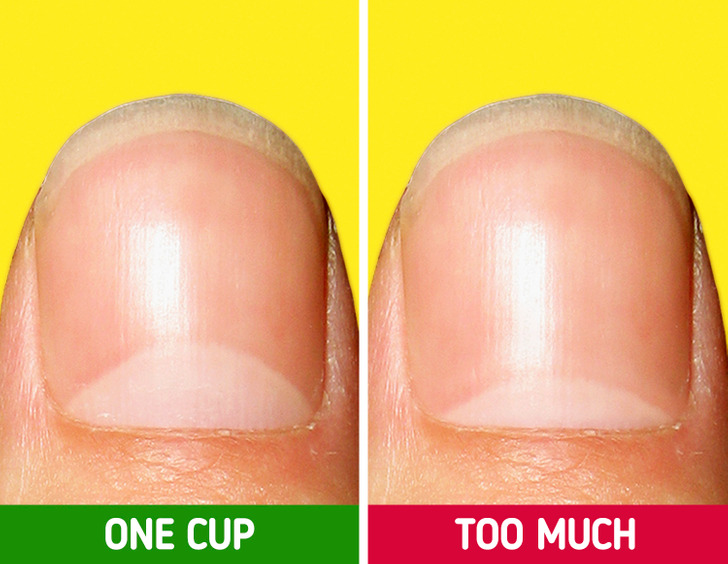Coffee is one of the most popular beverages worldwide, celebrated for its rich flavor and energizing effects. Millions start their day with a cup—or several—of coffee to boost alertness and productivity. However, while moderate coffee consumption can offer health benefits such as improved concentration and even reduced risk of certain diseases, excessive intake may lead to a range of negative side effects on your body. In this blog post, we explore what might happen if you drink too much coffee, from its effects on your nails and stomach to potential headaches and accelerated skin aging. By understanding these risks, you can make informed decisions about your coffee consumption and overall health.
Coffee and Nail Health: How Overconsumption Affects Your Nails

Your nails can often reflect your overall health, and surprising evidence suggests that excessive coffee intake might have a visible impact. When you consume too much coffee, the high caffeine content and associated acidity can potentially interfere with the absorption of essential vitamins and minerals such as biotin, zinc, and iron. These nutrients are crucial for maintaining healthy, strong nails.
Over time, this nutrient deficiency may lead to nail discoloration, brittleness, or even abnormal growth patterns. Although research in this area is still emerging, dermatologists and nutrition experts agree that the balance of essential vitamins is vital for nail health. If you’re noticing changes in your nails, it might be worth evaluating your overall dietary intake and considering if your coffee habit is contributing to the issue.
For more detailed insights on nail health and nutrition, check out resources from the American Academy of Dermatology and Healthline.
Digestive Distress: How Excessive Coffee Upsets Your Stomach

One of the most common complaints among heavy coffee drinkers is an upset stomach. Coffee is naturally acidic, and while a moderate amount can stimulate digestion, too much coffee can irritate the lining of your stomach. This irritation can lead to symptoms such as acid reflux, heartburn, and even gastritis in some individuals.
Caffeine, a major component in coffee, increases the production of stomach acid, which can overwhelm your digestive system when consumed in excess. For those with sensitive stomachs or pre-existing digestive conditions like irritable bowel syndrome (IBS), heavy coffee consumption might exacerbate these issues. Moreover, coffee can relax the lower esophageal sphincter, which increases the risk of acid reflux and heartburn after meals.
Experts recommend that if you experience chronic digestive discomfort, consider cutting back on coffee or switching to lower-acid alternatives. For additional guidance on managing acid reflux and other digestive issues, reputable sources such as Mayo Clinic and WebMD offer practical advice and treatment options.
Caffeine Overload and Headaches: Understanding Coffee-Induced Migraines

While coffee is often used as a remedy for headaches due to its ability to constrict blood vessels, drinking too much coffee can actually trigger headaches and migraines in some people. Caffeine’s effects on the central nervous system can be a double-edged sword: it can provide temporary relief for certain types of headaches, yet over time, excessive consumption may lead to caffeine dependency and withdrawal headaches.
When you regularly consume large amounts of caffeine, your body may develop a tolerance, meaning that more and more coffee is needed to achieve the same stimulating effects. If you then reduce your intake suddenly, you might experience withdrawal symptoms, including headaches, fatigue, and irritability. These caffeine withdrawal headaches can be severe and may last for several days.
Additionally, research indicates that caffeine can sometimes cause the dilation of blood vessels after its stimulating effects wear off, potentially leading to rebound headaches. For individuals prone to migraines, it’s crucial to monitor your caffeine intake and consider gradual reduction if you notice a pattern of headache recurrence. To learn more about the relationship between caffeine and headaches, visit the Harvard Health Publishing website and WebMD for detailed explanations and tips.
Accelerated Skin Aging: How Too Much Coffee May Affect Your Skin

The effects of excessive coffee consumption on your skin might surprise you. While moderate coffee consumption has been linked to antioxidant benefits, too much caffeine can potentially accelerate the aging process. One major factor is dehydration—caffeine is a diuretic, which means it can lead to increased fluid loss and leave your skin looking dry and dull. Over time, chronic dehydration may contribute to the formation of fine lines and wrinkles.
In addition, excessive coffee consumption may interfere with the production of collagen, the protein responsible for maintaining skin elasticity and firmness. Collagen depletion is a well-known contributor to premature skin aging, and when combined with the oxidative stress from excessive caffeine intake, your skin might show signs of aging faster than expected.
Moreover, high coffee consumption can increase stress hormones like cortisol, which further deteriorates skin health. Elevated cortisol levels have been associated with various skin issues, including acne, thinning skin, and a breakdown in collagen structure. For advice on maintaining healthy skin and preventing premature aging, consider exploring articles from Healthline and WebMD.
The Benefits and Drawbacks of Coffee: Striking the Right Balance
It’s important to note that coffee is not inherently harmful—moderation is key. When consumed in moderate amounts, coffee can offer various health benefits, such as improved mental alertness, enhanced physical performance, and even potential protection against certain diseases like Parkinson’s and type 2 diabetes. The key is finding the right balance that maximizes these benefits while minimizing adverse effects.
By understanding how to balance coffee consumption with proper hydration, nutrition, and skincare routines, you can enjoy your daily cup of coffee without worrying about negative side effects.
Strategies to Mitigate the Negative Effects of Excessive Coffee Consumption
If you’re concerned about the potential adverse effects of drinking too much coffee, there are several strategies you can adopt to mitigate these risks:
1. Moderation Is Key
Start by evaluating your current coffee intake and consider reducing the number of cups you drink each day. Health experts generally recommend limiting caffeine consumption to around 400 milligrams per day (roughly four 8-ounce cups of brewed coffee) for most adults. However, individual tolerance varies, so it’s essential to listen to your body.
2. Stay Hydrated
Since caffeine is a diuretic, it’s crucial to balance your coffee intake with plenty of water. Proper hydration not only helps combat the dehydrating effects of caffeine but also supports overall skin health and digestive function. Keeping a water bottle handy throughout the day is a simple yet effective way to ensure you remain well-hydrated.
3. Opt for Quality Over Quantity
Choose high-quality, organic coffee beans that are free from harmful additives and pesticides. Organic coffee often contains higher levels of antioxidants, which can help offset some of the oxidative stress caused by caffeine. Additionally, investing in good quality coffee can enhance your overall drinking experience and may even reduce the risk of adverse health effects.
4. Consider Decaffeinated Alternatives
If you enjoy the taste of coffee but are concerned about excessive caffeine, consider incorporating decaffeinated coffee into your routine. Decaf coffee provides many of the flavor and aromatic qualities of regular coffee without the high levels of caffeine, thereby reducing the risk of caffeine-related side effects.
5. Monitor Your Body’s Signals
Pay attention to how your body reacts to your coffee consumption. If you notice adverse effects such as digestive discomfort, headaches, or changes in your skin or nail health, it might be time to cut back. Consulting with a healthcare professional or a nutritionist can also provide personalized guidance on managing your caffeine intake effectively.
Additional Considerations: Lifestyle and Dietary Factors
The effects of excessive coffee consumption can also be influenced by other lifestyle and dietary factors. A balanced diet rich in vitamins, minerals, and antioxidants can help counteract some of the negative impacts of caffeine. For example, foods high in vitamin C and E, omega-3 fatty acids, and collagen-boosting nutrients can support skin health and overall well-being.
Incorporating regular physical activity and stress management techniques, such as meditation or yoga, can further enhance your body’s resilience against the potential adverse effects of too much coffee. Remember, maintaining a healthy lifestyle is about balance—moderation in every aspect, including your coffee habits, is essential.
For additional insights on nutrition and healthy lifestyle tips, consider visiting Mayo Clinic’s Nutrition and Healthy Eating section and WebMD’s Diet & Nutrition.
Conclusion: Finding Balance for Optimal Health
Coffee is a beloved beverage that, when enjoyed in moderation, offers numerous benefits. However, as we’ve explored in this article, excessive coffee consumption can lead to noticeable effects on your body, including nail discoloration, digestive distress, headaches, and accelerated skin aging. By understanding these risks and implementing strategies to mitigate them, you can continue to enjoy your daily brew without compromising your overall health.
Whether you choose to cut back, switch to decaffeinated options, or simply stay mindful of your body’s signals, finding balance is key. Remember that every individual’s tolerance and response to caffeine is different, so what works for one person may not work for another. Experiment with your routine and seek guidance from healthcare professionals if needed.
Excessive coffee may offer short-term energy boosts, but long-term health is built on a foundation of balance, proper nutrition, and hydration. By embracing a mindful approach to coffee consumption, you can savor the benefits while minimizing the risks.
For more expert advice on healthy coffee habits and lifestyle changes, check out the latest articles on Harvard Health Publishing and Healthline’s Coffee Health.
In conclusion, understanding the potential negative impacts of too much coffee—from its effects on nail health and stomach discomfort to headaches and premature skin aging—empowers you to make better choices for your overall well-being. Moderation, quality, and a balanced lifestyle are the cornerstones of enjoying your coffee safely and healthily. So, the next time you reach for that extra cup, remember that your body might be telling you it’s time to take a step back and reassess your routine.
Embrace a balanced approach to your daily coffee ritual and keep an eye on your body’s signals. With the right strategies in place, you can continue to enjoy the rich flavors and energy boost of coffee while safeguarding your health for the long term. Enjoy your coffee responsibly, and here’s to a healthier, happier you!
Preview photo credit Kommissar / Wikimedia Commons, CC0 1.0









Leave a Reply